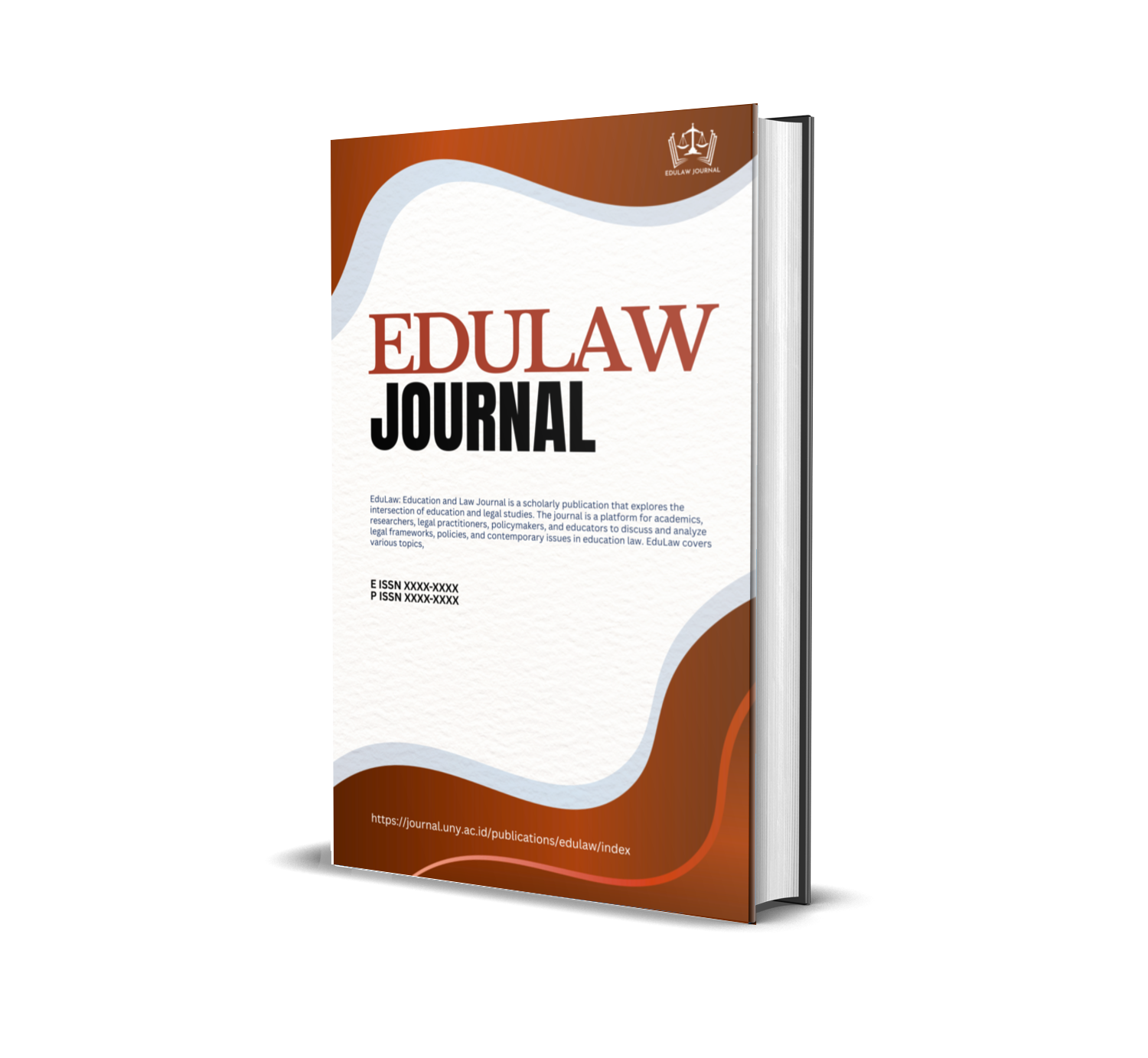Legal analysis of the protection of the rights of suspects and defendants from a human rights perspective (Study of constitutional court decision number 61/PUU-XX/2022)
DOI:
https://doi.org/10.21831/edulaw.v1i1.2216Keywords:
Constitutional Court, criminal procedure, due process of law, human rights, suspects and defendantsAbstract
This study examines the legal protection of the rights of suspects and defendants in the Indonesian criminal justice system from a human rights perspective, with a particular focus on Constitutional Court Decision Number 61/PUU-XX/2022. The research adopts a normative juridical method by analyzing constitutional provisions, statutory regulations, international human rights instruments, and judicial precedents. The findings demonstrate that the Constitution and the Criminal Procedure Code (KUHAP) guarantee fundamental rights such as the presumption of innocence, the right to legal counsel, and freedom from arbitrary arrest and detention. However, in practice, these guarantees are often undermined by law enforcement authorities, leading to violations of due process of law. The Constitutional Court decision provides a progressive interpretation by affirming that restrictions on individual rights must be based on law, proportionate, and aimed at protecting broader public interests. It also emphasizes the non-derogable nature of certain rights, particularly access to legal assistance and protection against arbitrary detention. This ruling is significant not only for strengthening the protection of suspects and defendants but also for shaping ongoing reforms of the Criminal Procedure Code in alignment with international human rights standards. The study contributes to academic discourse on criminal justice reform and offers practical implications for legislators, law enforcement officials, and policymakers in ensuring a more just and democratic legal system.
Downloads
References
Afandi, F., & Bedner, A. (2022). Between Upholding the Rule of Law and Maintaining Security. In Constitutional Democracy in Indonesia (pp. 67–88). Oxford University PressOxford. https://doi.org/10.1093/oso/9780192870681.003.0004
Indra Ariska, D. (2019). Pembaharuan hukum sistem peradilan pidana dalam RUU KUHAP. Yustitia, 5(1), 78–89. https://doi.org/10.31943/yustitia.v5i1.60
Kripsiaji, D., & Minarno, N. B. (2022). Perluasan Kewenangan dan Penegakan Hukum Praperadilan di Indonesia dan Belanda. Al-Mazaahib: Jurnal Perbandingan Hukum, 10(1), 29. https://doi.org/10.14421/al-mazaahib.v10i1.2573
Leben, S. (2019). Exploring the Overlap Between Procedural-Justice Principles and Emotion Regulation in the Courtroom. Oñati Socio-Legal Series, 9(5), 852–864. https://doi.org/10.35295/osls.iisl/0000-0000-0000-1068
Mandjo, J., & Sarson, M. T. Z. (2021). The Right to Obtain Free Assistance and Legal Protection for The Indigent People Through Legal Assistance Organizations. Jambura Law Review, 3(2), 365–377. https://doi.org/10.33756/jlr.v3i2.9424
Muhtar, A. K. Z., Muh. Risnain, & Zunnuraeni. (2024). The The Right to Life Based on The International Covenant on Civil And Political Rights And Its Application In Indonesian National Law. Mataram Journal of International Law, 2(2), 125–144. https://doi.org/10.29303/majil.v2i2.5031
Ni Komang Sutrisni, Putu Angga Pratama Sukma, Embong, R., & Haydarov, K. (2024). The Compliance of Governance on Family Data Protection Regulation. Journal of Human Rights, Culture and Legal System, 4(3), 706–741. https://doi.org/10.53955/jhcls.v4i3.293
Noor, M. S., Munawar, A., & Rahmathoni, L. Y. (2025). Paradigma Baru Hukum Acara Pidana: Rekonstruksi Perlindungan Hak Asasi Tersangka dalam Proses Peradilan. Jurnal Hukum Lex Generalis, 5(12). https://doi.org/10.56370/jhlg.v5i12.821
Nurwati, N., & Husna, L. (2025). Perlindungan hukum terhadap hak hak tersangka dalam sistem penyidikan berkeadilan berbasis hak asasi manusia. SCIENTIA JOURNAL : Jurnal Ilmiah Mahasiswa, 7(3). https://doi.org/10.33884/scientiajournal.v7i3.9678
Pangaribuan, A. (2025). Authority, Rights, and Reform: Legislative Struggles over Indonesia’s Criminal Procedure Code (1979–1981). Asian Journal of Comparative Law, 1–20. https://doi.org/10.1017/asjcl.2025.10004
Prasetyo, D., & Herawati, R. (2022). Tinjauan Sistem Peradilan Pidana Dalam Konteks Penegakan Hukum dan Perlindungan Hak Asasi Manusia Terhadap Tersangka di Indonesia. Jurnal Pembangunan Hukum Indonesia, 4(3), 402–417. https://doi.org/10.14710/jphi.v4i3.402-417
Sahran Hadziq, & Gatot Sugiharto. (2024). Vicarious Liability Dalam KUHP Nasional Dikaji dari Perspektif Living Law di Yogyakarta. Lex Renaissance, 9(1), 134–156. https://doi.org/10.20885/JLR.vol9.iss1.art7
Suastuti, E., Haq, L. M. H., Harimurti, Y. W., & Yuherawan, D. S. B. (2024). Transformation and Effects of Human Rights Protection on Determining Corruption Suspects as a Pretrial Object under the Indonesian Criminal Justice System. Lex Scientia Law Review, 8(2), 817–858. https://doi.org/10.15294/lslr.v8i2.14667
Sukiyawati, La Ode Bunga Ali, Rajasree, & Zakurdaeva. (2023). Contrasting Legal Aid in Jinayat and KUHAP: Free Counsel Provision Diverges in Procedural Laws. Al-Ahkam: Jurnal Ilmu Syari’ah Dan Hukum, 8(2), 109–123. https://doi.org/10.22515/alahkam.v8i2.8236
Utami, R., Rainariga, R., Mu’aliamah, M., & Damayanti, D. D. (2023). Hak asasi manusia berdasarkan konsepsi sejarah dunia dan perkembangannya di Indonesia. Advances In Social Humanities Research, 1(4), 372–385. https://doi.org/10.46799/adv.v1i4.44
Downloads
Published
How to Cite
Issue
Section
Citation Check
License
Copyright (c) 2025 Abelia Permatasari

This work is licensed under a Creative Commons Attribution-NonCommercial-ShareAlike 4.0 International License.
Authors who publish with this journal agree to the following terms:
- Authors retain copyright and grant the journal right of first publication with the work simultaneously licensed under a Creative Commons Attribution License that allows others to share the work with an acknowledgement of the work's authorship and initial publication in this journal.
- Authors are able to enter into separate, additional contractual arrangements for the non-exclusive distribution of the journal's published version of the work (e.g., post it to an institutional repository or publish it in a book), with an acknowledgement of its initial publication in this journal.
- Authors are permitted and encouraged to post their work online (e.g., in institutional repositories or on their website) prior to and during the submission process, as it can lead to productive exchanges, as well as earlier and greater citation of published work (See The Effect of Open Access).









